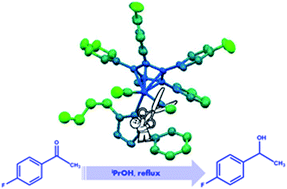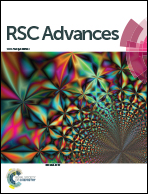Ruthenium hydroxycyclopentadienyl N-heterocyclic carbene complexes as transfer hydrogenation catalysts†
Abstract
A series of novel cationic hydroxycyclopentadienyl and methoxycyclopentadienyl N-heterocyclic carbene ruthenium(II) complexes have been synthesized from the corresponding neutral ruthenium(0) complexes containing both the non-innocent cyclopentadienone ligand and variously functionalized N-heterocyclic carbenes (NHCs). In particular an NHC derivative containing a pyridine group in the side chain has been designed and developed in order to evaluate the influence of a basic, potentially cooperative substituent in the catalytic activity of these complexes. All the prepared complexes were employed as selective catalysts for transfer hydrogenation reactions employing refluxing iPrOH as a hydrogen source and several ketones and aldehydes as substrates. We found that while the presence of oxidizing additives such as CAN and benzoquinone is mandatory to activate the neutral ruthenium(0) complexes, no activation is needed for the cationic Ru(II) catalysts. The catalytic activity of the latter is also influenced by the coordinating ability of the counterion, and indeed the cationic complexes having a pyridine-functionalized NHC ligand and CF3SO3− as counterion, present the best conversion (>99%) thus demonstrating the fundamental role played by the basic pyridine in the catalytic activity. With regard to the hydrogenation reaction mechanism, the release of the CO ligand was demonstrated to be the key step and the presence of hydride species has been detected at the end of the reaction.


 Please wait while we load your content...
Please wait while we load your content...